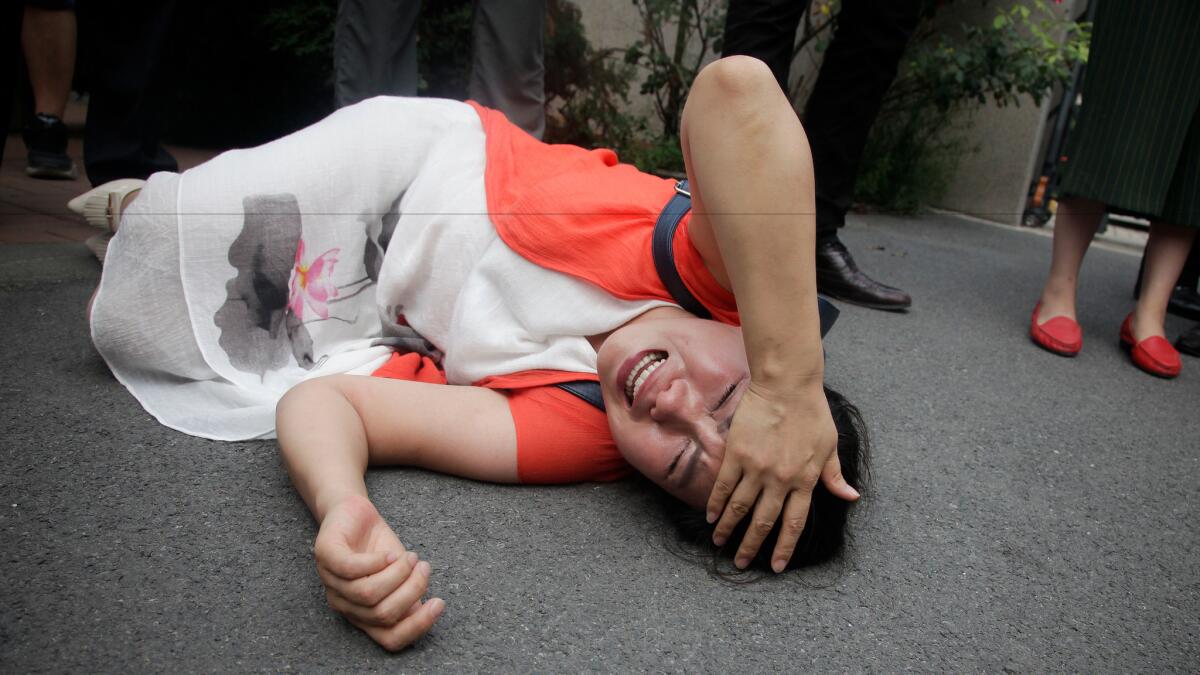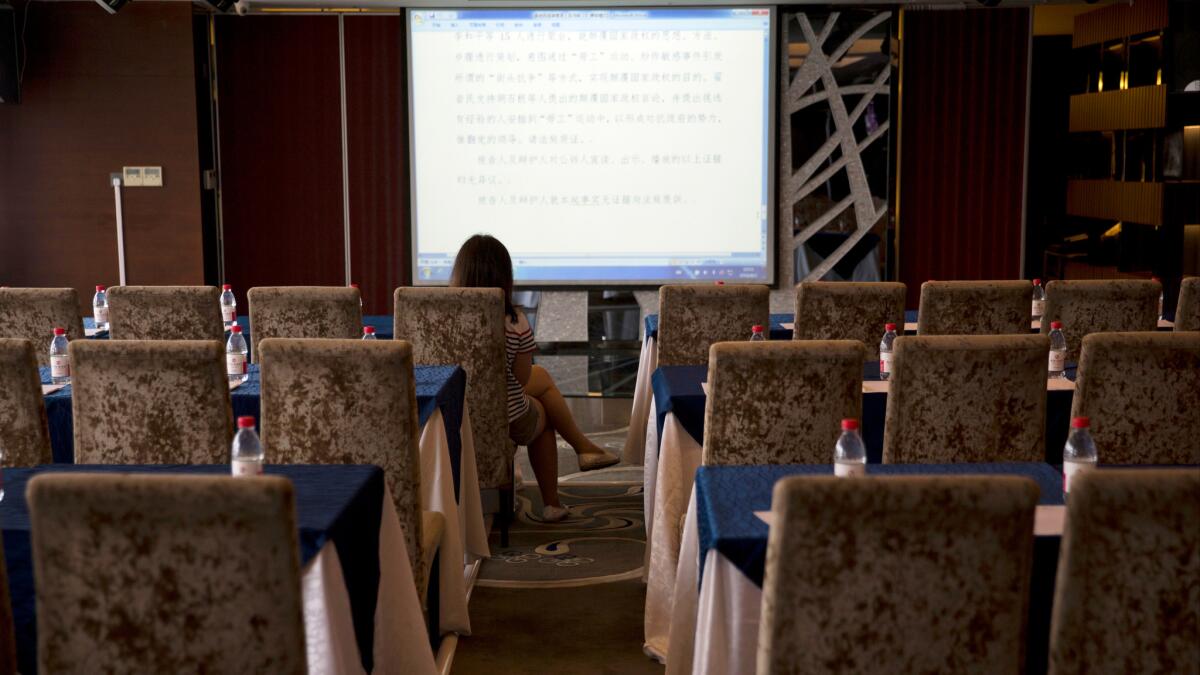China puts activists, lawyer on trial for subversion
- Share via
Reporting from Beijing — China is putting three human rights activists and one lawyer on trial this week in the eastern city of Tianjin, and on Tuesday the court handed down the first verdict, finding one defendant guilty of subversion and imposing a three-year suspended prison sentence.
Authorities have tried to give the proceedings an air of transparency by handpicking a few media outlets from Hong Kong and Taiwan to be present in the courtroom. But family members of the accused have complained that they have not been allowed to contact the defendants during their year-plus detention and that the defendants were not allowed to choose their attorneys.
Zhai Yanmin, 55, was sentenced Tuesday after a three-hour trial. The state-run newspaper China Daily said he had posted comments on the Internet that “harmed national security and social stability” and “organized protests to disturb the public order.”
The three others who will stand trial this week are Zhou Shifeng, director of the Beijing-based Fengrui Law Firm, and two other activists, Gou Hongguo and Hu Shigen.
The four are among approximately 300 human rights activists and lawyers detained in a crackdown that began last summer. About 20 of those who were held remain in custody.

Last year, a number of state-run media outlets ran identical articles accusing Zhou and his lawyers of forming a “major criminal gang that organized and planned the creation of an uproar in more than 40 sensitive cases and that seriously disturbed social order.” The lawyers also sought to undermine the Communist Party and enrich themselves, the report claimed.
On Tuesday, foreign reporters who tried to enter the courtroom at the Tianjin Municipal No. 2 Intermediate People’s Court found roads near it sealed off, and they were met by a large number of police.
Some journalists were then taken by bus to a nearby hotel where they were allowed to watch a “live transcript” from the trial projected onto a screen.
On Monday, the eve of the trials, a videotaped confession made by another detained attorney from the Fengrui firm, Wang Yu, aired on a website affiliated with the Hong Kong newspaper Oriental Daily.
Wang was well known for taking up sensitive cases, representing feminists, members of the spiritual movement Falun Gong (which China has banned and declared an evil cult) and a professor from the Uighur ethnic minority who was sentenced to life in prison in 2014 on charges of separatism.
In the video, Wang renounced her legal work and blamed “foreign groups” for instilling dangerous notions in her. She pledged that she would no longer accept awards from foreign organizations. “I am Chinese, and I only accept the Chinese government’s leadership,” she said robotically.

Friends and associates of Wang have said they believed the confession was made under duress, like a number of other broadcast confessionals in the last two years. Wang was arrested in January and was accused of subverting state power.
The U.S. Embassy in Beijing released a statement Monday saying the U.S. “remains concerned by the Chinese government’s continuing efforts to harass, intimidate and prosecute defense lawyers and human rights activists for their work.”
China Human Rights Defenders, an advocacy group, said in a statement on the eve of the trials that “the use of ‘national security’-related charges to target human rights lawyers and activists has become a hallmark of [Chinese leader] Xi Jinping’s reign.” It accused authorities of “grossly” abusing their power in handling the detainees, “disregarding Chinese laws and violating international human rights conventions.”
A consistent theme running through the recent trials and confessionals has been statements from the accused saying they were influenced by foreigners, and pledging to stay away from them in the future. The confessors have painted human rights lawyers as troublemakers who should be avoided — perhaps to discourage ordinary citizens from seeking out their assistance.
In his final statement to the court on Tuesday, Zhai said he wanted to remind the public to be aware of the “true meaning behind the slogans about democracy and human rights,” reported the South China Morning Post, which was allowed to send a reporter into the courtroom. He also pledged he would not talk to any foreign media or media “hostile” to Beijing.
See the most-read stories in World News this hour >>
Zhai’s wife, Lin Ermin, told the paper she had received no official notification of the verdict and never had access to the government-appointed lawyer nor was able to attend her husband’s hearing.
According to China Human Rights Defenders, Zhai had been detained several times since 2014 on suspicion of “picking quarrels and provoking trouble” by rallying for the release of detained human rights defenders. He was also held by police in 2014 for supporting the Hong Kong democracy protests. He participated in the 1989 pro-democracy protests as a student, the group said.
A taped confession by Zhai was aired by Chinese state-run media in June 2015, in which he expressed remorse for working with people petitioning the government. He apologized for causing “terrible, negative social influence” and “disturbing the social order.”
Zhai apparently is eligible to return home, given his suspended sentence, but will also have his “political rights” suspended for four years. Like other released activists, he will likely be subject to heavy surveillance by police.
Lin told the Post that she wanted to appeal, calling the outcome “totally unacceptable.” If authorities silence him, she told the paper, “how is that different from being dead?”
Follow me on Twitter @JulieMakLAT
MORE WORLD NEWS
China puts activists, lawyer on trial for subversion
Why some of Brazil’s growing homeless population would rather stay on the streets
Taliban claims responsibility for bombing of compound for foreigners in Kabul
More to Read
Sign up for Essential California
The most important California stories and recommendations in your inbox every morning.
You may occasionally receive promotional content from the Los Angeles Times.













